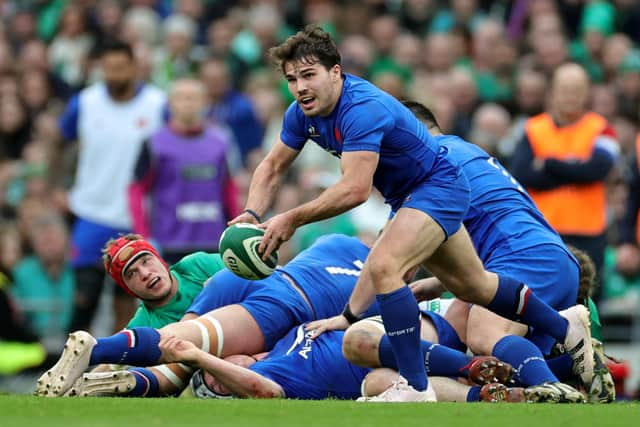Scotland can be quietly confident going to France but defeat in a close match would be no disaster
It’s a mark of the maturity of the French game now that defeat in Dublin hasn’t resulted in wholesale change. Indeed there is only one change, that made necessary by the suspension of that formidable and engaging prop Uini Atonio, red-carded, somewhat harshly I thought, in Dublin, and subsequently suspended. Likewise there is only one change in the Scotland team that beat Wales. Well, as Graham Bean sagely remarked in these columns the other day, consistency in selection goes often with a winning run. In contrast, down in Cardiff, Welsh coach Warren Gatland seems to have thrown his cards up in the air and picked those that landed on the table face-up. Nine changes from the team beaten by Scotland; no panic in the Valleys, surely.
Selectors today might be forgiven if they think they have almost too much information – data , they’ll call it – about players. Back in the old amateur days selectors has very little. Hence their often wild vagaries. It’s also the case now that the best professional players are concentrated in only a few clubs. Flip back in the record books and you see players selected from a variety of clubs, in France for instance from such as Lourdes, Dax, Tarbes, Mont-de Marsan, Aurillac, La Voulte; in Scotland, not only from all seven clubs of the Border League, but from numerous ones where membership was restricted to those entitled to wear the Old School Tie.
Advertisement
Hide AdAdvertisement
Hide AdThe first great French player of whom I took note was Jean Prat, their captain, a flanker from the Lourdes club that was setting the style of adventurous French play after the War. He was a talkative player and, at Twickenham once his constant chirping so irritated a colleague that he chucked the ball to Prat saying “well, you do something with it” – or probably something more lurid. Whereupon the Great Man dropped a goal.


The French were for long among the readiest to kick a drop goal. One fly-half, Pierre Albaladejo from Dax, was so addicted to it that he became known as Monsieur Le Drop. Bill McLaren enjoyed introducing the Watsonian fly-half Ian Robertson, not noted for his skill with the boot, to the French maestro as “Monsieur Un Drop”. I don’t understand why the drop goal seems to be disdained by today’s professionals. But then I can’t understand why so few full-backs, and half-backs can’t kick well with either foot. France’s brilliant captain Antoine Dupont is an exception and a rare one.
France must start as favourites today, and not only because they are at home. Nevertheless they lost an admittedly marvellous game in Dublin after somewhat scrappily, in the end even fortunately, winning in Rome, a match in which their forwards’ understanding of the Law at the breakdown seemed very different from the referee’s. You might therefore quite reasonably say that this richly talented team is due a big performance.
There are good reasons however for Scotland to feel quietly confident, chief among them their proven ability to score tries on the counter-attack and from long range – this a very welcome change from the long minutes we have so often spent battering vainly at the opposition try-line.
That said, we spent an awful lot of time defending against both England and Wales, and as intelligent, well-organised and committed as that defence was, one couldn’t avoid the thought that more powerful, enterprising and skillful opponents would have breached our defences more often. Well, France are just that. So it is unlikely to be so comfortable lying back and waiting for the moment to counter-attack, brilliant as that counter-attack has been.
The result matters, obviously, for both teams. For Scotland, it’s a chance to maintain momentum, for France an opportunity to regain it. If we bring our best to the Stade de France, it could be a classic, win or lose. Defeat in a close match might not really stall our progress. In this respect the one to follow against Ireland at Murrayfield is more important. Bur for France, with a visit to Twickenham to come, defeat would be a real set-back for their hopes of winning the World Cup in the autumn.
Comments
Want to join the conversation? Please or to comment on this article.